While many people are familiar with cookies, they may not fully understand their purpose or how to manage them effectively. In this article, we'll explain why using a cookie editor is important and highlight some popular options worth considering. It's worth noting that most of the tools discussed are primarily Chrome extensions.
Cookie Editors: Why Do We Edit Cookies?
Cookies are small files that websites store on your device (like a computer or smartphone) when you visit them. These files hold data about your interactions with the website, which are related to your online privacy. They help websites remember things about you, such as:
- Login status: So you don't have to log in every time you visit.
- Preferences: Like language settings or dark mode.
- Shopping cart contents: For online stores, cookies remember what you've added to your cart.
There are different types of cookies. Generally there are three basic types: (1) Session cookies: Temporary cookies that are deleted when you close your browser. (2) Persistent cookies: These stay on your device until they expire or are manually deleted. Websites use these to remember you across multiple sessions. (3) Third-party cookies: Created by domains other than the website you're visiting, often for tracking purposes (like targeted ads).
Cookies can be convenient, but there are situations where editing or managing them is useful for your online activity management.
- Privacy Concerns: Some cookies track your browsing behavior across different websites, which can be a privacy issue. Editing or deleting these cookies can limit unwanted tracking.
- Debugging and Testing: Web developers and testers often edit cookies when they need to test how different user settings or states (like login sessions) affect the site.
- Clear Corrupted Data: Sometimes cookies get corrupted or outdated, which can cause issues with how a site functions. Editing or deleting cookies can fix problems like being unable to log in or incorrect site behavior.
- Manage Preferences: You might want to manually tweak certain settings, like language preferences or saved forms, by editing cookies directly rather than navigating the website's settings.
In short, cookies play a crucial role in web functionality, but editing them gives you greater control over your online privacy, site performance, and troubleshooting. In these instances, a cookie editor can be an invaluable tool.
What is a Cookie Editor?
A cookie editor is a free browser extension or add-on designed to help users efficiently manage the cookies for the websites they visit. It offers a simple, user-friendly interface that makes it easy to view and make changes to cookies. With just a few clicks, you can gain more control over your browsing experience, ensuring better privacy and smoother website interactions without needing to dive deep into the technical aspects of cookie management.
What is Cookie Editor used for?
Web Development and Testing
Cookie Editor is ideal for developers and testers to create, modify, or delete cookies while developing and testing web applications. It enables them to simulate different scenarios and user states by manipulating cookies without leaving the current tab.
Software Quality Assurance (QA)
QA professionals can utilize Cookie Editor to test websites by setting up specific cookie values and verifying the application's behavior under different conditions.
Search Engine Optimization (SEO)
SEO experts can use Cookie Editor to analyze and manage cookies that may impact website rankings and user experience.
Manual Cookie Management for Privacy
Cookie Editor allows users to take control of their online privacy by manually managing cookies, such as deleting tracking cookies or modifying cookie values to prevent unwanted data collection.
Improving Browsing Experience
By editing or deleting specific cookies, users can enhance their browsing experience, for example, by removing cookies that cause annoying pop-ups or advertisements.
The key features of Cookie Editor include listing all cookies for the current tab, searching cookies, creating, editing, and deleting cookies, importing and exporting cookies in various formats (JSON, Netscape, Header string), quickly deleting all cookies for the current tab, and customizing the interface (e.g., theme, advanced mode)
Cookie Editor Works with the Antidetect Browser
What's more, Cookie Editor can be a useful tool when working with antidetect browsers. While Cookie Editor is not specifically designed for antidetect browsers, its cookie management capabilities complement the functionality of antidetect browsers by allowing efficient handling of cookies across different browser profiles and scenarios.
Importing Cookies into New Browser Profiles
Antidetect browsers like Hidemyacc allow creating new browser profiles with different fingerprints to avoid detection. As shown in, Cookie Editor can be used to import cookies from existing accounts (e.g., Gmail, social media) into these new browser profiles. This allows accessing websites with imported cookies, appearing as a trusted user instead of a new visitor.
Managing Cookies for Privacy and Testing
Cookie Editor's core functionality of viewing, adding, editing, and deleting cookies can be beneficial when using antidetect browsers. It allows managing cookies for privacy purposes, such as deleting tracking cookies, or simulating different scenarios by modifying cookie values for testing purposes.
Exporting and Sharing Cookies
The ability to export cookies from Cookie Editor can be useful when working with antidetect browsers. Exported cookies can be shared between different browser profiles or devices, enabling access to accounts without revealing login credentials.
Best Cookie Editors in 2025
One of the most popular and highly rated cookie editors, especially for Chrome users. EditThisCookie is highly rated for its ease of use and flexibility, making it a great tool for both everyday users and developers looking to manage cookies efficiently.
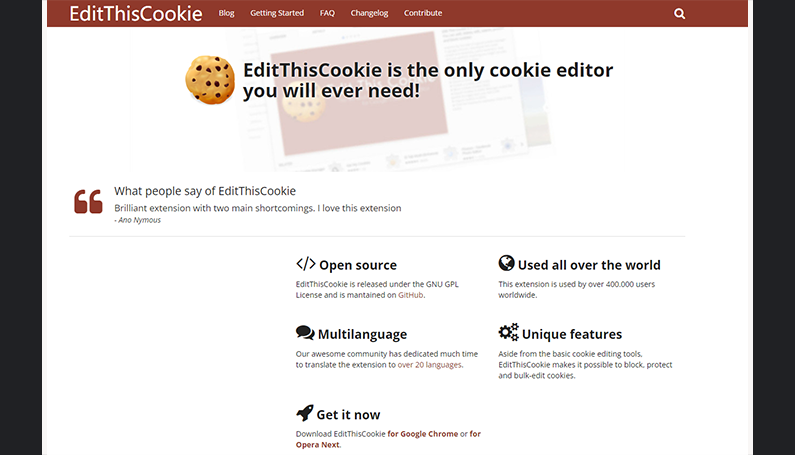
It provides a simple interface to perform actions like:
- View cookies: See all the cookies stored by a website, including details like their name, value, domain, expiration date, etc.
- Edit cookies: Modify the values of existing cookies. This is particularly useful for developers or for users who want to change preferences without going through the website's UI.
- Delete cookies: Remove individual cookies or clear all cookies for a website in one go, which can help with privacy or troubleshooting issues.
- Add new cookies: Create cookies manually, which can be helpful for testing or development.
- Block cookies: Prevent specific cookies from being set, offering more control over unwanted tracking.
A powerful and user-friendly cookie editor that works across multiple platforms like Windows, Mac, Linux, and Chrome OS. It offers features like whitelisting cookies, creating encrypted cookie sets with password protection, and easy export/import.
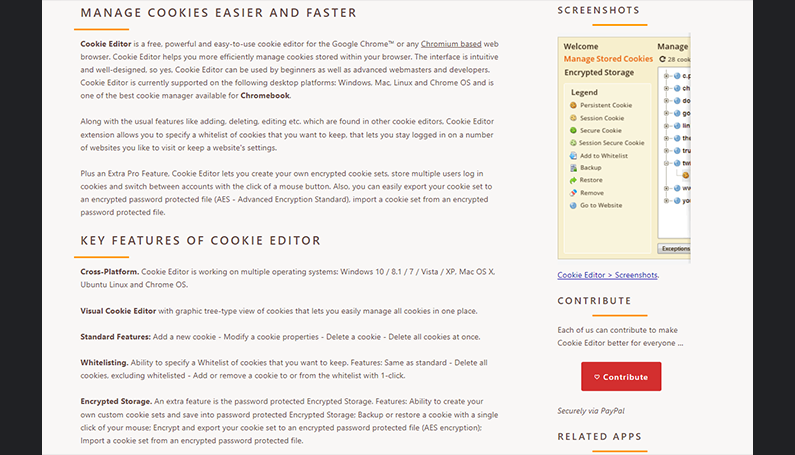
Its simple interface makes it accessible to both casual users and web developers who need to manage and test cookies efficiently. Its basic functions are listed below for your reference:
- View and manage cookies: Like other cookie editors, it allows users to view all the cookies set by a website, including their details like name, value, domain, path, expiration date, etc.
- Edit cookies: Users can modify the values of existing cookies, which is useful for debugging, testing, or changing website settings.
- Delete cookies: The extension lets you delete individual cookies or all cookies associated with a specific website, which can help with privacy concerns or site performance issues.
- Add new cookies: You can manually add new cookies to a website, which can be helpful in development scenarios or managing user sessions.
- Export and import cookies: This feature allows users to back up their cookies or share them across devices or browsers. It's particularly useful for developers or those who want to maintain consistency across multiple browsers.
An open-source, simple, fast, and straightforward cookie editor available for all major browsers, including mobile apps for Android and iOS. It's well-maintained and optimized for creating, editing, and deleting cookies with just a few clicks.
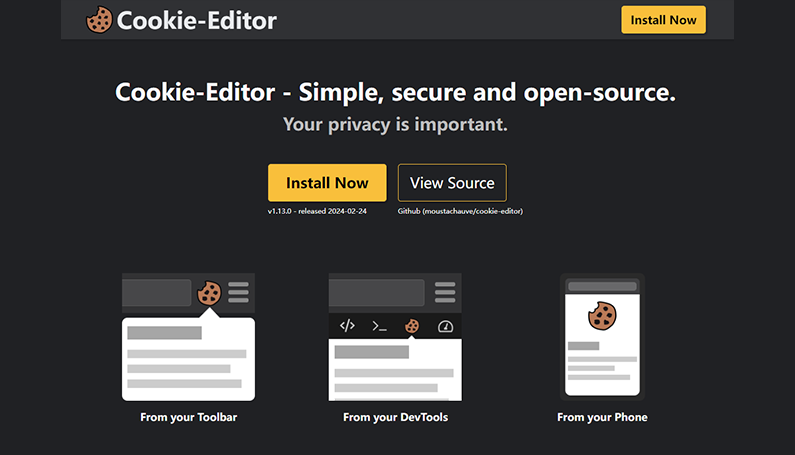
Overall, Cookie-Editor is a valuable tool for anyone looking to take control of their cookie management, offering features that cater to both casual users and developers. Here are some of its key features:
- User-friendly interface: It offers an easy-to-navigate layout for viewing and managing cookies, making it accessible even for those who aren't technically inclined.
- View and edit cookies: Users can easily view cookie details and modify values as needed, which is useful for adjusting preferences or testing.
- Delete and add cookies: You can delete specific cookies or add new ones, providing flexibility in how you manage your browsing data.
- Import and export functionality: This feature allows users to back up cookies or transfer them between different browsers or devices, which is handy for developers or users managing multiple environments.
- Cross-browser compatibility: Cookie-Editor is available for multiple browsers, ensuring a consistent experience across platforms.
Cookie Controller is a browser extension designed to give users granular control over cookie management, with a focus on privacy and convenience. It is available for browsers like Firefox and provides a wide range of features aimed at enhancing how cookies are handled. It provides buttons for managing site cookie permissions, switching global cookie permissions on and off, browsing cookies, and removing cookies.
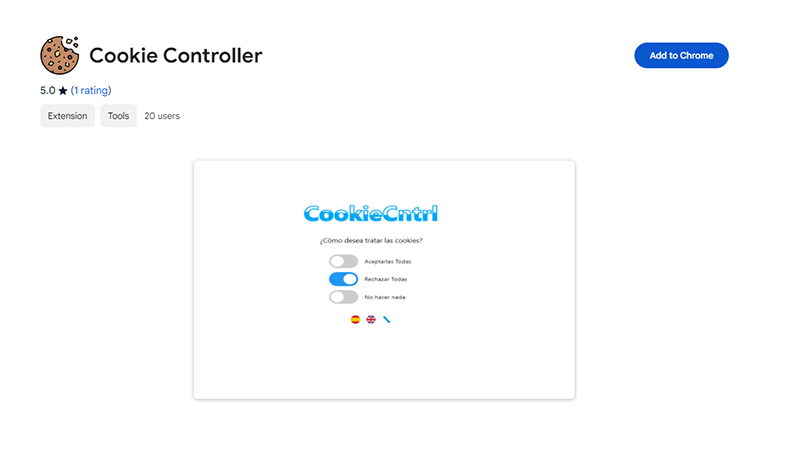
Here are some of its key functions:
- On-the-fly cookie management: Cookie Controller allows you to control cookies as you browse, offering quick access to accept, block, or delete cookies for any website in real-time.
- Automatic handling: Users can set rules to automatically accept, reject, or delete cookies based on their preferences. This is useful for maintaining privacy without having to manually manage cookies every time.
- Per-site permissions: The extension provides the ability to manage cookies on a site-by-site basis. You can choose how to handle cookies for individual websites, which is handy if you trust certain sites but want to block others.
- Session and persistent cookie control: Cookie Controller allows you to specify whether you want cookies to be session-only (deleted when the browser is closed) or to allow persistent cookies that stay on your device for a longer time.
- UI integration: The extension integrates well with the browser's interface, typically adding a small icon or menu where users can quickly change cookie settings without navigating through complicated menus.
- Quick toggles for blocking or allowing: It provides easy toggle switches or buttons for blocking or allowing cookies instantly, offering fast privacy adjustments while browsing.
Cookie Manager is a browser extension designed to help users manage cookies stored by websites. It provides a range of features that cater to both everyday users and developers who need to control cookie behavior for privacy or testing purposes.
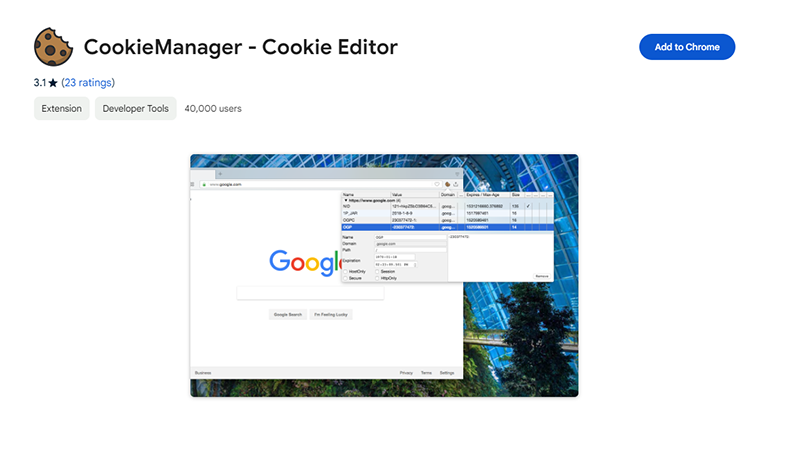
Let's take a closer look at its key features:
- View cookies: Cookie Manager offers a detailed view of all cookies stored by a website, including information such as the name, value, domain, expiration date, and other attributes.
- Add, edit, and delete cookies: Users can easily create new cookies, edit existing ones, or delete specific cookies. This feature is useful for web developers who need to simulate different user states, as well as for users looking to clear specific tracking cookies.
- Search and filter: Cookie Manager allows users to search for cookies by name or domain, making it easier to locate specific cookies, especially when a site stores multiple cookies.
- Export and import cookies: Cookie Manager includes the ability to export cookies to a file or import them back into the browser. This feature is handy for backing up cookies, sharing between browsers, or maintaining specific cookie states across devices.
- Session and persistent cookies: Users can decide whether to keep cookies for the current session only or allow them to persist across sessions. This is particularly useful for managing privacy or login data across multiple visits.
- Privacy and tracking control: Cookie Manager helps users gain more control over tracking mechanisms by making it easy to remove third-party cookies, block specific cookies, or limit their lifespan. This can help reduce online tracking and improve privacy.
Easy Cookie Editor is a browser extension designed to simplify cookie management for users, offering a balance of functionality and ease of use. It is primarily available for Chrome and Firefox, with features aimed at giving users control over how cookies are handled while browsing.
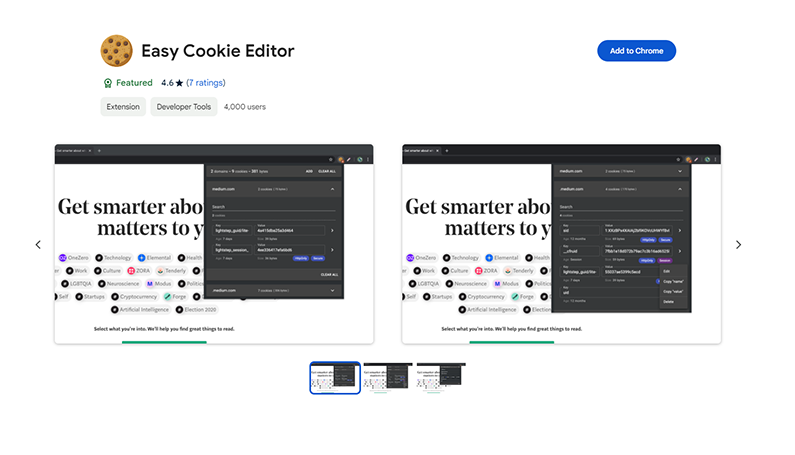
Here are the main features and highlights:
- View & Edit Cookies: The extension allows users to view and edit all cookies set by the current website, displaying essential details such as the name, value, domain, expiration date, and other attributes. This is useful for modifying cookie data, especially for developers who need to simulate specific scenarios or users wanting to adjust site preferences manually.
- Cookie Search and Filtering: It includes a search function that helps users quickly locate specific cookies among the many that may be stored by a site, making cookie management more efficient.
- Session and Persistent Cookies: The extension gives control over session cookies (which expire when the browser is closed) and persistent cookies (which last for longer periods). Users can easily clear session cookies or convert cookies between session and persistent modes.
- Export and Import Cookies: Users can export cookies to a file, useful for backups or transferring cookies between browsers or devices. This feature is especially helpful for developers or users who need to maintain consistent settings across different environments.
- Third-party Cookie Management: Easy Cookie Editor also helps manage third-party cookies, which are often used for tracking purposes. This allows users to gain more control over their privacy by limiting or deleting third-party cookies.
Broom Cookie Cleaner & Cookie Editor is a browser extension designed to simplify cookie management by offering a dual purpose: cleaning unwanted cookies and editing existing ones.

Here's an overview of its main features and functionality:
- Cookie Cleaner: The extension provides a fast way to delete unwanted or unnecessary cookies. It allows users to clear cookies either individually, for specific websites, or for all websites at once, which helps improve privacy and browser performance.
- Cookie Editor: Users can manually edit cookies with the extension, modifying attributes such as name, value, domain, path, expiration date, and more. This feature is useful for developers or for users who want to tweak site preferences or settings stored in cookies.
- Selective Deletion: Broom Cookie Cleaner allows you to delete cookies from a particular domain or subdomain, giving users more control over which cookies to remove while keeping the ones they may need.
- Whitelist Functionality: It includes an option to create a whitelist of websites, ensuring that cookies from trusted sites are never deleted. This is handy for users who want to clear unwanted cookies while retaining important cookies for login or site preferences.
- Session and Persistent Cookies: The extension allows users to manage both session and persistent cookies. You can choose to delete session cookies when you close your browser or manage persistent cookies by setting expiration times or manually clearing them.
- Improved Privacy Control: By enabling easy removal of third-party and tracking cookies, Broom Cookie Cleaner & Cookie Editor helps users maintain better privacy while browsing the web, limiting the tracking capabilities of advertisers or other external parties.
Frequently asked questions (FAQ) about cookie editors
Q1: How do I import cookies into my browser using a cookie editor?
To import cookies, you'll typically need to have the cookie data saved in a compatible format (such as JSON). Open your cookie editor, find the import feature (often under settings or tools), select your cookie file, and follow the prompts to load the cookies into your browser. The specific steps can vary depending on the cookie editor and browser you are using.
Q2: How can I export cookies from my browser using a cookie editor?
To export cookies, open your cookie editor and look for the export option. This usually allows you to save your cookies in a file format such as JSON or CSV. Select the cookies you want to export, choose the file format, and specify the location where you want to save the file. The process may vary slightly depending on the cookie editor and browser.
Q3: Are there any security concerns when importing or exporting cookies?
Yes, there are security considerations to keep in mind. Cookies can contain sensitive information, such as login tokens or session IDs. When importing or exporting cookies, ensure that the files are stored securely and that you only share them with trusted parties. Be cautious about uploading cookie files to untrusted websites or services.
Q4: Can I import cookies from one browser to another?
Yes, you can import cookies from one browser to another, but the process might require using a cookie editor or extension that supports cross-browser compatibility. Export the cookies from the source browser, and then use the import feature in the target browser's cookie editor to load the cookies. Some cookie editors may offer specific tools or settings to facilitate this process.